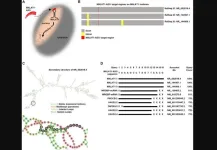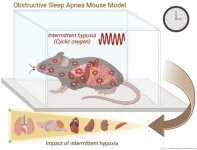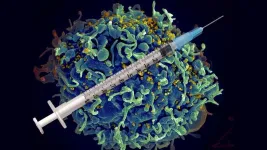(Press-News.org) Today’s substance use prevention efforts ignore individual genetic risk, but Rutgers research suggests DNA test results may eventually enhance prevention and treatment and improve outcomes.
Investigators recruited 325 college students, provided them with varying levels of information about alcohol use disorder and how genetics affect addiction risk and asked them how they would react to learning they had high, medium and low genetic tendencies toward alcoholism.
The results provided two significant supports for eventually using real genetic risk scores in actual addiction prevention efforts. First, participants understood what those scores indicated; they recognized that higher genetic risk scores meant a higher likelihood of developing alcohol problems. Second, most participants said they would drink less and take other steps to prevent addiction if actual scores showed high risk.
“There are a lot of steps between the discovery of addiction-related genes and the effective use of genetic information in prevention and treatment,” said Danielle Dick, director of the Rutgers Addiction Research Center and senior author of the study published in the American Journal of Medical Genetics. “This trial paves the way for studies using real genetic data and for integrating genetic information into prevention and intervention efforts.”
Adoption and twin studies indicate addiction risk is roughly half genetic, Dick said, but there’s no single addiction gene that’s either present or absent. Instead, there are thousands of interacting genes, so each person’s genetic risk falls somewhere on a continuum.
Risk isn’t distributed evenly along that continuum: It’s distributed in a bell curve. A small number of people have high or low genetic risk (at the tail ends of the curve), but most people fall in the middle of the curve, she said. Knowing one’s level of genetic risk can help people make the best choices for their health and well-being. Individuals at higher genetic risk are more likely to develop problems with alcohol use, so they can take precautionary steps with their substance use.
Despite the relative complexity of the risk calculation, study participants formed relatively accurate impressions of the risk for addiction associated with various genetic results. Future research will investigate whether other populations understand risk scores as well as the college students in this trial.
Another important finding was that individuals reported they would experience moderate distress if they learned they were at high genetic risk for addiction. This suggests that providers should be mindful of how to return high-risk genetic results and consider accompanying this information with counseling. Encouragingly, as individuals received increasing levels of genetic risk, they also reported greater intentions to seek additional information, such as talking with a healthcare provider and engaging in harm reduction practices.
“Overall, the results strongly encourage the notion that real genetic risk scores may prove helpful in preventing and treating alcohol addiction,” Dick said. “Comprehension of test results was high. Psychological distress remained at manageable levels. The vast majority of individuals indicated that they’d take action to reduce their risk if they learned they were at elevated genetic risk, and, fortunately, there was no indication that people would interpret low-risk scores as an invitation to take fewer precautions.”
Dick emphasized we still know little about how real-world genetic information will affect real-world behavior. Most known addiction genes were discovered in the past few years, and many more remain to be discovered. No commercial genetic testing service provides information about addiction risk, so very few people have ever received genuine information about their genetic tendency toward addiction. What’s more, stated intentions often differ from subsequent actions.
“There was a hope that compelling information about elevated genetic risk would get people to change behavior, but we haven’t seen that happen for other aspects of health,” Dick said. “Initial studies suggest that receiving genetic feedback for heart disease, lung cancer, and diabetes does not get people to change their behavior. Getting people to alter their behavior is hard. Providing them with good risk information is just the first step. We then need to connect individuals to resources and support to help them reduce risk. That’s what my team is currently working on -- helping people understand their addiction risk and how they can reduce that risk and avoid developing problems.”
END
Genetic risk information may help people avoid alcohol addiction
2023-05-30
ELSE PRESS RELEASES FROM THIS DATE:
Advances in technology are driving popularity of EVs
2023-05-30
Transportation accounts for roughly one-third of U.S. greenhouse gas emissions, and adoption of electric vehicles are seen by many experts in government and the private sector as a vital tool in efforts to reduce carbon emissions. Roughly a decade ago, EVs accounted for a tiny fraction of overall car sales. As of March 2023, they make up 7% of new sales
“What changed between then and now?” asks Kenneth Gillingham, professor of environmental and energy economics at the Yale School of the Environment. ...
Newborns with higher hair cortisol levels take longer to fall asleep
2023-05-30
DARIEN, IL – Cortisol levels in late pregnancy can predict the sleep of infants, according to a new study to be presented at the SLEEP 2023 annual meeting.
Results show that newborns with higher levels of cortisol in their hair samples took longer to fall asleep at 7 months of age. Neonatal hair cortisol is a measure of fetal cortisol in the last trimester of pregnancy.
“Although increases in cortisol across pregnancy are normal and important for preparing the fetus for birth, our findings ...
That’s not nuts: Almond milk yogurt packs an overall greater nutritional punch than dairy-based
2023-05-30
May 30, 2023
That’s Not Nuts: Almond Milk Yogurt Packs an Overall Greater Nutritional Punch than Dairy-Based
UMass Amherst food science major completes comparison of 612 plant-based and dairy yogurts
AMHERST, Mass. – In a nutritional comparison of plant-based and dairy yogurts, almond milk yogurt came out on top, according to research led by a University of Massachusetts Amherst food science major.
“Plant-based yogurts overall have less total sugar, less sodium and more fiber than dairy, but they have less protein, calcium and potassium than dairy yogurt,” ...
Using AI to create better, more potent medicines
2023-05-30
COLUMBUS, Ohio – While it can take years for the pharmaceutical industry to create medicines capable of treating or curing human disease, a new study suggests that using generative artificial intelligence could vastly accelerate the drug-development process.
Today, most drug discovery is carried out by human chemists who rely on their knowledge and experience to select and synthesize the right molecules needed to become the safe and efficient medicines we depend on. To identify the synthesis paths, scientists often employ a technique called retrosynthesis – a method for creating potential drugs by working backward from the wanted molecules and searching for chemical reactions ...
Quest for alien signals in the heart of the Milky Way takes off
2023-05-30
May 30, 2023, Mountain View, CA – Akshay Suresh, a graduate student at Cornell University, spearheads an extraordinary scientific endeavor -- a groundbreaking mission to uncover periodic signals emanating from the core of the Milky Way called the Breakthrough Listen Investigation for Periodic Spectral Signals (BLIPSS). Such repetitive patterns could be the key to unlocking the mysteries of extraterrestrial intelligence in our galaxy. Suresh and his co-authors detail the project’s results thus far in a paper accepted for publication in the Astronomical Journal, “A 4–8 GHz Galactic Center Search for Periodic Technosignatures.”
BLIPSS ...
Deconstructing the role of MALAT1 in MAPK-Signaling in melanoma
2023-05-30
“In this study, we present novel transcriptional dependencies between MALAT1 and MAPK-pathway-associated genes in melanoma.”
BUFFALO, NY- May 30, 2023 – A new research paper was published in Oncotarget's Volume 14 on May 26, 2023, entitled, “Deconstructing the role of MALAT1 in MAPK-signaling in melanoma: insights from antisense oligonucleotide treatment.”
The long non-coding RNA (lncRNA) MALAT1 is a regulator of oncogenesis and cancer progression. MAPK-pathway upregulation is the main event in the development and progression of human cancer, including melanoma and recent studies have shown that MALAT1 has a significant impact on the ...
Obstructive sleep apnea disrupts gene activity throughout the day in mice
2023-05-30
The low blood oxygen levels of obstructive sleep apnea cause widespread changes in gene activity throughout the day, according to a new study in the open-access journal PLOS Biology by David Smith of Cincinnati Children’s Hospital Medical Center, US, and colleagues. The finding may lead to tools for earlier diagnosis and tracking of the disorder.
Obstructive sleep apnea (OSA) occurs when the airway becomes blocked (usually by soft tissue, associated with snoring and interrupted breathing during the night), resulting in intermittent hypoxia (low blood oxygen) and disrupted sleep. ...
Researchers use ‘natural’ system to identify proteins most useful for developing an effective HIV vaccine
2023-05-30
Since it was identified in 1984 as the cause of Acquired Immune Deficiency Syndrome (AIDS), the human immunodeficiency virus (HIV) has infected more than 80 million people and been responsible for some 40 million deaths worldwide, according to the World Health Organization (WHO). Currently, the WHO reports more than 38 million people globally live with the retrovirus, and each year, another 1 million new cases are diagnosed. While antiretroviral therapy helps keep HIV in check, patients must stay on their medication to prevent the development of AIDS.
Scientists have spent years trying to develop an ...
Researchers identify link between alternative gene splicing and risk of alcohol use disorder
2023-05-30
INDIANAPOLIS—Researchers at Indiana University School of Medicine have discovered alternative gene splicing, which occurs during gene expression, can impact a person’s risk of alcohol use disorder (AUD). They recently published their findings in Molecular Psychiatry.
“AUD is a common and complex genetic disorder that happens people experience problems related to excessive alcohol consumption,” said Rudong Li, PhD, a postdoctoral fellow in the YunLong Liu, PhD Laboratory and lead author of the paper. “This discovery has revealed ...
Novel approach significantly improves access, decreases wait times for autism screening
2023-05-30
FOR IMMEDIATE RELEASE, May 30, 2023
Contact: Gina DiGravio, 617-358-7838, ginad@bu.edu
Novel Approach Significantly Improves Access, Decreases Wait Times for Autism Screening
Developmentally Trained-Primary Care Clinicians can reduce disparities for children referred for developmental evaluation
(Boston)—Autism spectrum disorder (ASD) is a neurodevelopmental disorder characterized by impairments in social communication and the presence of repetitive and restricted behaviors or interests. The American Academy of Pediatrics (AAP) recommends autism-specific screening at 18- and 24-month well-child visits, yet earlier diagnosis has been shown to ...



